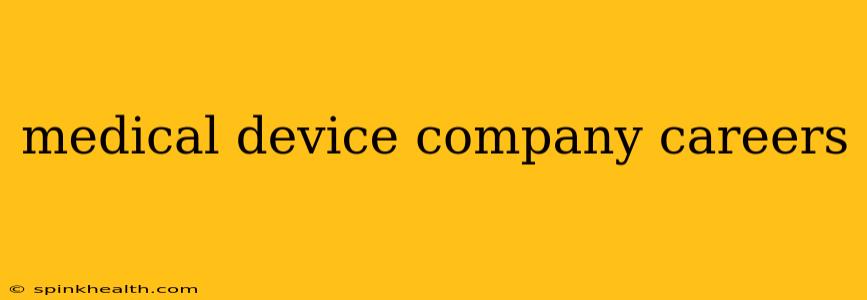The whirring of sophisticated machinery, the quiet hum of innovation, the palpable sense of purpose – this is the world of medical device companies. If you're driven by a desire to improve lives and work at the cutting edge of technology, a career in this field might be your perfect calling. But it's a vast landscape, offering a plethora of opportunities. Let's explore the exciting pathways available within medical device companies.
What are the different types of jobs in medical device companies?
This isn't a simple question, as the industry spans numerous disciplines. From the initial spark of an idea to the final product reaching a patient, countless roles are crucial. We can broadly categorize them into:
Research & Development (R&D): This is the heart of innovation. Scientists, engineers (biomedical, mechanical, electrical), and designers collaborate to conceive, develop, and test new medical devices. Think groundbreaking prosthetics, minimally invasive surgical tools, or life-saving diagnostic equipment. This department often includes roles in materials science, software engineering, and regulatory affairs.
Manufacturing & Production: Once a device is designed, skilled professionals ensure its efficient and consistent production. This includes roles in quality control, manufacturing engineering, supply chain management, and operations management. Precision and adherence to strict regulations are paramount.
Marketing & Sales: Getting life-saving technology into the hands of those who need it requires a dedicated marketing and sales team. These professionals build relationships with healthcare providers, hospitals, and distributors, ensuring the devices reach their intended users. Strong communication and understanding of the healthcare system are essential.
Regulatory Affairs: Navigating the complex regulatory landscape is critical. Regulatory affairs professionals ensure compliance with FDA (and other international) standards and guidelines throughout the entire product lifecycle. This is a highly specialized and crucial role.
Clinical Affairs: This team bridges the gap between research and clinical practice. They design and execute clinical trials, collect and analyze data, and prepare submissions for regulatory bodies. They are crucial in demonstrating the safety and efficacy of new devices.
What skills are needed for a medical device company career?
The skills required vary significantly depending on the specific role. However, some crucial attributes are consistent across the industry:
- Technical Skills: A strong foundation in science, engineering, or technology is essential for many roles, particularly in R&D and manufacturing.
- Problem-Solving Skills: Medical device development often involves complex challenges, demanding creative and analytical thinking.
- Collaboration Skills: Most roles involve working in teams, requiring strong communication and teamwork skills.
- Regulatory Knowledge: Understanding the regulations governing medical devices is critical for many roles, particularly regulatory affairs.
- Communication Skills: Whether presenting research findings, marketing a product, or training healthcare professionals, effective communication is crucial.
What is the average salary for a medical device company career?
Salary expectations vary wildly based on experience, location, role, and company size. Entry-level positions might start around $50,000 annually, while experienced professionals in senior roles can earn significantly more, often exceeding $200,000 per year. However, location plays a significant role; salaries in major metropolitan areas tend to be higher.
What are the educational requirements for a medical device company career?
Educational requirements depend heavily on the desired role. Many roles require a bachelor's degree, while others necessitate a master's or even a PhD. Common degrees include biomedical engineering, mechanical engineering, electrical engineering, biology, chemistry, and materials science. For regulatory affairs, a law degree or specialized certification might be beneficial.
What are the career progression opportunities in medical device companies?
Career progression is often tied to experience and demonstrated skill. Entry-level positions can lead to more senior roles within the same department or offer opportunities to transition to different areas within the company. With experience and continued learning, you could rise to become a project manager, department head, or even a senior executive.
The world of medical device company careers is dynamic and rewarding. It's a field where passion meets purpose, offering ample opportunities for those driven to improve healthcare through innovation and collaboration. Whether you're drawn to the intricacies of design, the precision of manufacturing, or the impact of sales, a career in this field offers a fulfilling path for individuals committed to making a tangible difference in people's lives.

